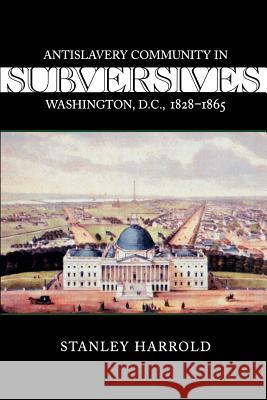Subversives: Antislavery Community in Washington, D.C., 1828--1865 » książka
Subversives: Antislavery Community in Washington, D.C., 1828--1865
ISBN-13: 9780807128381 / Angielski / Miękka / 2002 / 280 str.
"An excellent study of the antislavery struggle in the streets and black alleys of Washington, D.C. The book is exceptionally well constructed. The argument is clear and easy to follow."-American Historical Review While many scholars have examined the slavery disputes in the halls of Congress, Subversives is the first history of practical abolitionism in the streets, homes, and places of business of the nation's capital. Historian Stanley Harrold looks beyond resolutions, platforms, and debates to describe how desperate African Americans - both free and slave - and sympathetic whites engaged in a dangerous day-to-day campaign to drive the "peculiar institution" out of Washington, D.C., and the Chesapeake region. That slavery was both vulnerable and vicious in Washington is at the heart of Harrold's study. Northern and foreign visitors were outraged by its existence in the seat of American government. For the South, Washington was a vital stronghold at the section's border. As economic changes caused slavery's decline in the Chesapeake and masters dismembered slave families by selling them South, local African Americans sought and received the support of a small number of whites eager to strike a blow against slavery in a strategic and very symbolic setting. Together they formed a subversive community that flourished in and about the city from the late 1820s through the mid-1860s. Risking beatings, mob violence, imprisonment, and death, these men and women distributed abolitionist literature, purchased the freedom of slaves, sued to prevent families from being separated, and aided escape efforts. Harrold overcomes the secrecy inherent in Washington's antislavery community to document its formation and activities with remarkable detail and perception. He shows how slaveholders and their sympathizers fought to reinforce their hold on a system under attack and how the dissidents raised a radical challenge to the existing social order simply by engaging in interracial cooperation. While some subversives held power as politicians and journalists, most were obscure individuals. Black and white women played an important role. PRAISE FOR THE BOOK "An excellent study of the antislavery struggle in the streets and black alleys of Washington, D.C. The book is exceptionally well constructed. The argument is clear and easy to follow."-American Historical Review "Compelling reading. Focusing on antislavery battles below the Mason-Dixon line, Harrole masterfully recasts well-known historical incidents . . . withing a southern context. With Subversives Harrold has placed the discussion of assisted flight from the slave South nearer to the center of antislavery studies."-Journal of African American History
"An excellent study of the antislavery struggle in the streets and black alleys of Washington, D.C. The book is exceptionally well constructed. The argument is clear and easy to follow."-American Historical ReviewWhile many scholars have examined the slavery disputes in the halls of Congress, Subversives is the first history of practical abolitionism in the streets, homes, and places of business of the nations capital. Historian Stanley Harrold looks beyond resolutions, platforms, and debates to describe how desperate African Americans - both free and slave - and sympathetic whites engaged in a dangerous day-to-day campaign to drive the "peculiar institution" out of Washington, D.C., and the Chesapeake region.That slavery was both vulnerable and vicious in Washington is at the heart of Harrolds study. Northern and foreign visitors were outraged by its existence in the seat of American government. For the South, Washington was a vital stronghold at the sections border. As economic changes caused slaverys decline in the Chesapeake and masters dismembered slave families by selling them South, local African Americans sought and received the support of a small number of whites eager to strike a blow against slavery in a strategic and very symbolic setting. Together they formed a subversive community that flourished in and about the city from the late 1820s through the mid-1860s. Risking beatings, mob violence, imprisonment, and death, these men and women distributed abolitionist literature, purchased the freedom of slaves, sued to prevent families from being separated, and aided escape efforts. Harrold overcomes the secrecy inherent in Washingtons antislavery community to document its formation and activities with remarkable detail and perception. He shows how slaveholders and their sympathizers fought to reinforce their hold on a system under attack and how the dissidents raised a radical challenge to the existing social order simply by engaging in interracial cooperation. While some subversives held power as politicians and journalists, most were obscure individuals. Black and white women played an important role.PRAISE FOR THE BOOK"An excellent study of the antislavery struggle in the streets and black alleys of Washington, D.C. The book is exceptionally well constructed. The argument is clear and easy to follow."-American Historical Review"Compelling reading. Focusing on antislavery battles below the Mason-Dixon line, Harrole masterfully recasts well-known historical incidents . . . withing a southern context. With Subversives Harrold has placed the discussion of assisted flight from the slave South nearer to the center of antislavery studies."-Journal of African American History











